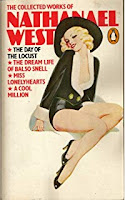The Day of the Locust by Nathanael West: a review

Oh boy. This book. I should start by giving
the same warning that I was given: this book’s age is reflected by the language
used about women and minorities. If you don’t wish to read a book where
prejudice against this people is apparent, this book isn’t for you. I don't blame you, really don't. I will say that the book is, on the whole, an interesting look at Hollywood and its faults but the book does contain many faults of its own.
The story follows Tod Hackett’s life in 1930s Hollywood.
It’s a satirical piece that thrives off caricatures of the kinds of people
there at the time. Though the book follows Tod for the majority, there are a couple of cases where the narration follows others. All of the characters are intertwined so we always make our way back to Tod. The points where West diverts from his lead are the points where, for me, the story seems to falter. It's a nice way of seeing how his world comes together but it doesn't feel entirely necessary.
West’s use of slurs against people of colour, gay people,
and, most commonly, women are apparent throughout. Sometimes it could be
misconstrued as his way of showing how ridiculous the whole thing is. However,
he uses these slurs so often it becomes all too obvious that this book truly is
a product of its time. However, that is not a reason to dismiss it completely.
If this book were released today, I would condemn it, but this is not showing
itself to be anything more than a book of the 1930s. Its merits do show and
it’s and excellent satire of Hollywood at the time. When Tod is searching
through someone in the movie sets, he travels between them like he’s travelling
between real worlds. He goes between deserts and Parisian streets, seeing
people eating cardboard food. It’s a beautiful metaphor for the falseness of
the world around him. I do wish that more of this book was as beautifully
written; perhaps to an audience of the time there were clearer references that
I missed out on but, to me there were few bits of this book that were so well
put together.
West has a very strange way with description. I don't mean his description of women and minorities, that's not strange, it's disgraceful. No, I just mean his general, world building description. There's a chapter dedicated to describing a house. This, in and of itself, is fine but he goes into painful detail of the exterior, and three rooms inside. The description doesn't do much for me anyway but he then ends the chapter with "there was also a bathroom and a kitchen". It was so absolutely infuriating. If I have to sit through this man's excruciating detail of this house, I do not want him to throw away two rooms. It's true that I wouldn't have liked the description but it would have been far more satisfying to read than the nonsense I was given. There are many unforgivable things in this book but this seems to stick out to me and, yes, I am fully aware that my morals are very skewed by this but honestly it just isn't okay.
I don’t know if I recommend this book. While its
satirical merits are there, there are many moments that made me incredibly
uncomfortable. Maybe that’s the point. Perhaps West didn’t want this to be an
easy read; that would certainly make sense for what this book is. It does feel
like a warning against the lust for fame as much as it’s a satire on the people
who do it. Also the end of that chapter still sits with me and would not wish it upon anyone. You know what? Don't read this. That chapter ending makes any messages about Hollywood null and void. That whole chapter wasn't fantastic anyway but he still somehow ruined it. Go read a book that you like.


Comments
Post a Comment